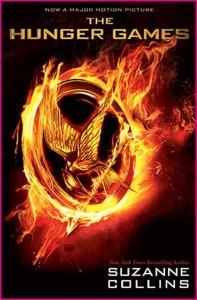Identity & Substitution in THE HUNGER GAMES
“Hope, it is the only thing stronger than fear.”
 They didn’t get everything right. I know, I know, we were ALL disappointed with what Katniss was wearing at the opening ceremonies in the film adaptation of Suzanne Collins’ New York Times Bestseller, The Hunger Games. The CGI fire just didn’t do it justice, and Jennifer Lawrence looked like she was wearing a leftover stillsuit from Dune. Still, since my wife Kat and I read the trilogy just a month before the film came out, I still stand by the fact that it’s one of the faithful adaptations of a book done, period. From the great casting (most notably Donald Sutherland and Woody Harrelson) to the deft line of bloody-yet-PG-13 violence, everything save for the costumes was superb.
They didn’t get everything right. I know, I know, we were ALL disappointed with what Katniss was wearing at the opening ceremonies in the film adaptation of Suzanne Collins’ New York Times Bestseller, The Hunger Games. The CGI fire just didn’t do it justice, and Jennifer Lawrence looked like she was wearing a leftover stillsuit from Dune. Still, since my wife Kat and I read the trilogy just a month before the film came out, I still stand by the fact that it’s one of the faithful adaptations of a book done, period. From the great casting (most notably Donald Sutherland and Woody Harrelson) to the deft line of bloody-yet-PG-13 violence, everything save for the costumes was superb.
Since Cinemagogue’s focus isn’t really playing fashion police, however, we’ll move on. Like peasants of Pan Em clued to the arena telecast, this film is dominating the box office and the hearts and minds of viewers and critics, and likely will win out over Good Friday and Easter weekend. I think this is appropriate, since the pivotal ideas of identity and substitution – proxy, tribute, sacrifice – play such key roles in the film, a little glimmer of what this holiday weekend is all about as Jesus offered himself in our place.
(The Hunger Games is available on DVD and Blu-ray
.)
Whether you’ve seen the film or read the book, you can check out this Spoiler-free video review. We’ll follow up with a written review addressing other elements that can only be addressed by revealing key plot points, and finally an in-depth audio review.
Watch on Youtube or using the browser below.
Podcast: Play in new window | Download | Embed
Subscribe: Apple Podcasts | RSS





“I was channel surfing between reality TV programming and actual war coverage when Katniss’s story came to me. One night I’m sitting there flipping around and on one channel there’s a group of young people competing for, I don’t know, money maybe? And on the next, there’s a group of young people fighting an actual war. And I was tired, and the lines began to blur in this very unsettling way, and I thought of this story.” Suzanne Collins
I was thinking about this interview the whole time I was sitting in the movie. It hung over me as I watched the adaptation of Collin’s first book in the Hunger Games series. The book series does a masterful job of giving us a world where children are taken from their homes and put in gladiatorial games to keep the “peace”. But the movie left me wanting. There seems to be something lost in the translation. The message that one gets from reading the Hunger Games is the horror of a world where violence for children is a way of life. The kids in District 1 are even trained till the age of 18 to be killing machines. It is not hard to see how Collins is showing a generation, who has grown up on video game violence and reality-TV idiots, that life is not fake. This message seemed to get lost in the medium of film. There, on the screen, is the same violence that every movie, video game and TV show has and it did not seem different. Collins does such a good job in the book of making each one of the characters in the arena come alive before the games start. You know them better, so that as the teens turn on each other, you can feel the weight of their deaths. In the movie there is not time for this, we don’t get to spend time with the characters and so as they are killed there is not emotion, no connection. The horror of what has just happened is not felt because I don’t know them enough to care. This is the biggest fault of the film and its greatest failing of the source material. The message is definitely watered down and almost lost unless you have read the books.
I really agree with you about the other themes; love, sacrifice and substitution. They are very strong in the film. But the lack of focus on the themes that Collins writes so well in the books, the horrors of violence and war, make this film ok, but not great. You should come out of this movie asking, “How close are we to this reality, where children are killed everyday for connivence or war?” And the answer, we are there.